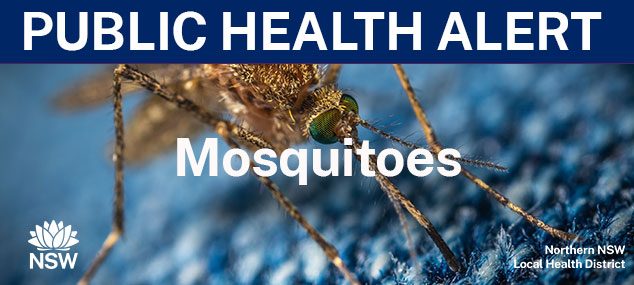
With floodwater subsiding across Northern NSW, the North Coast Public Health Unit is reminding residents and visitors to protect themselves from mosquitoes.
In addition to Ross River and Barmah Forest viruses, NSW Health is also warning the public of more serious conditions carried by mosquitoes, following confirmation of two Japanese encephalitis virus (JEV) cases in NSW.
Locally acquired cases of JEV have never previously been identified in NSW in animals or humans. JEV is usually only found in far northern Australia and neighbouring countries. To date, there have not been any reported cases in Northern NSW.
JEV can cause severe neurological illness with headache, convulsions and reduced consciousness in some cases.
Director North Public Health Unit, Dr Paul Douglas, said recent rainfall and pools of water mean mosquito numbers are increasing.
“As our area is expected to see higher number of mosquitoes, it’s a timely reminder for people to take simple steps to avoid being bitten,” Dr Douglas said.
“We know that many parts of our region have been severely impacted by floodwater, and people are working hard to clean up around homes and yards.
“To reduce areas for mosquitoes to breed around your home, remove all water-holding rubbish, regularly flush out pot plant bases, keep house guttering clear, and make sure openings of septic tanks and water tanks are covered and screened securely,” Dr Douglas said.
To minimise the risk of mosquito bites:
- Cover up as much as possible when outside. Wear light-coloured, loose-fitting clothing and covered footwear.
- Use an effective repellent on all exposed skin. Re-apply repellent within a few hours, as protection wears off with perspiration. The best mosquito repellents contain Diethyl Toluamide (DEET) or Picaridin. Those containing oil of lemon eucalyptus also provide adequate protection.
- Use mosquito coils outdoors. Devices that use light to attract and electrocute insects are not effective.
- Cover all windows, doors, vents and other entrances with insect screens.
- If staying in tents or caravans, use flyscreens on caravans and tents or sleep under mosquito nets.
For more information about mosquito-borne infections go to is available on the NSW Health website.